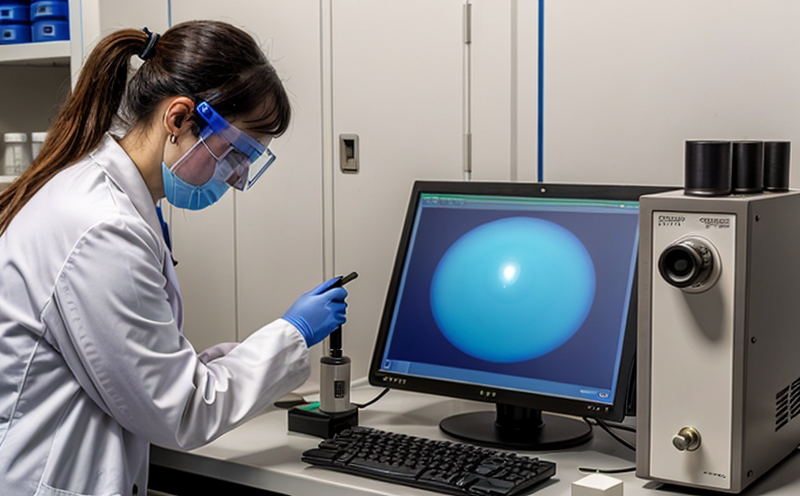DIN EN 15376 Spectroscopic Analysis of Bioethanol Content
The DIN EN 15376 standard specifies a method for determining the bioethanol content in ethanol solutions using near-infrared spectroscopy. This service ensures accurate and precise quantification, which is critical for compliance with regulatory standards and quality assurance in sectors like pharmaceuticals, food and beverage, and fuel production.
The process begins with the preparation of samples according to ISO 16025:2018, ensuring that each sample reflects the true composition of the ethanol solution. Once prepared, the samples are analyzed using a near-infrared spectrophotometer designed for this specific application. The instrument measures the absorbance at various wavelengths that correlate with the presence of bioethanol in the solution.
Following analysis, the data is processed through software that applies regression models to calculate the percentage of bioethanol based on the spectral response obtained. This method provides rapid results compared to traditional gravimetric or titrimetric methods, making it ideal for quality control and process optimization.
The accuracy and reliability of this technique are enhanced by using a reference database established through multiple calibration runs against certified standards. The use of near-infrared spectroscopy ensures that the analysis is non-destructive and provides real-time feedback on the bioethanol content.
This service plays a crucial role in ensuring compliance with international standards such as DIN EN 15376, ISO 9001:2015 for quality management systems, and EU regulations concerning biofuels. It supports industries that rely on high-quality ethanol solutions by providing consistent and accurate data.
The application of this method extends beyond mere compliance; it also facilitates the development of new products and processes in areas like renewable energy and sustainable chemicals production. By ensuring uniformity in product quality, this service contributes to building trust within supply chains and among consumers.
Quality and Reliability Assurance
The reliability of DIN EN 15376 spectroscopic analysis is underpinned by rigorous validation processes that adhere strictly to international standards. Each laboratory adheres to ISO/IEC 17025:2017, ensuring that all analytical services are conducted in a controlled and calibrated environment.
Our laboratories employ certified personnel who undergo continuous training to maintain their proficiency with the latest spectroscopic techniques. Regular audits by independent bodies ensure compliance with these standards. Additionally, our equipment is regularly calibrated against primary reference standards to guarantee precision and accuracy.
Data generated from this analysis is thoroughly validated through inter-laboratory comparisons where results are compared across multiple facilities using different instruments. This process ensures that the results are consistent and reliable across various testing environments. Reporting follows strict guidelines set forth by ISO/IEC 17025:2017, providing clear, comprehensive documentation of every test conducted.
The use of advanced software for data processing further enhances reliability. The software not only processes raw spectral data but also provides automated quality checks to flag any anomalies or outliers in the results. This ensures that final reports are accurate and trustworthy, meeting all relevant regulatory requirements.
Competitive Advantage and Market Impact
- Informed Decision-Making: By providing precise bioethanol content data, this service enables companies to make informed decisions about product development, quality control, and supply chain management.
- Enhanced Compliance: Ensuring compliance with international standards like DIN EN 15376 helps companies avoid costly penalties and reputational damage associated with non-compliance.
- Improved Product Quality: Accurate bioethanol content measurement leads to higher-quality products, which can be a key differentiator in competitive markets.
- Innovation Support: This service supports innovation by providing reliable data that can be used for research and development purposes.
The ability to consistently measure bioethanol content accurately gives companies a significant edge over competitors who may lack the same level of precision. It enables them to stay ahead in terms of regulatory compliance, product quality, and market positioning.
By leveraging DIN EN 15376 spectroscopic analysis, businesses can ensure that their products meet the highest standards, thus gaining customer trust and loyalty. This service also opens up opportunities for new markets and collaborations by demonstrating a commitment to excellence in analytical chemistry.
Use Cases and Application Examples
This service finds extensive applications across various industries where bioethanol content needs to be accurately determined. Here are some specific use cases:
- Petrochemical Industry: Ensuring the correct blend of bioethanol in fuel products for compliance with environmental regulations.
- Beverage Industry: Verifying the alcohol content in spirits and liqueurs to maintain brand consistency and quality.
- Fuel Production: Monitoring the production process to ensure that bioethanol is added at the correct concentration, enhancing fuel efficiency and reducing carbon footprints.
- R&D Laboratories: Supporting research into sustainable chemical processes and developing new products with precise bioethanol content specifications.
In each of these scenarios, the precision offered by DIN EN 15376 spectroscopic analysis is crucial. It allows stakeholders to make data-driven decisions that can lead to cost savings, increased efficiency, and improved product quality.
For example, in the petrochemical industry, accurate bioethanol content measurement helps companies comply with stringent regulations on renewable fuel blends. In the beverage sector, this ensures consistent alcohol levels across different batches of spirits, maintaining brand reputation. For fuel producers, it aids in optimizing production processes and reducing waste.





